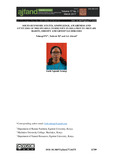| dc.description.abstract | Chronic diseases of lifestyle are increasing in global prevalence and they threaten developing nations’ ability to improve the health of their populations. Previously, lifestyle diseases were thought to be diseases of the affluent but poor populations are now equally affected. This is largely due to the environment in which the poor reside and socio-economic circumstances that influence their diets and physical activity patterns. This study aimed at determining the association between socio-economic status, knowledge, awareness, and attitudes and the prevalence of obesity, diagnosed diabetes and hypertension in the Swahili community of Old Town and Kisauni districts in Mombasa County, Kenya. A cross-sectional study design was administered. Cluster sampling was used to randomly pick the 207 households. Data was collected using a semi-structured researcher administered questionnaire. Knowledge, awareness and attitudes were addressed using questions on balanced diet, healthy eating, healthy body weight, obesity, diabetes, hypertension and diabetes and hypertension causes. Socio-economic status was addressed by questions on the educational levels, occupation and income. Focus Group Discussions and Key Informants Interviews were used to collect qualitative data. Data analysis was done using the Statistical Package for the Social Sciences version 11.5 computer software. Results indicate that about 36.8% of the individuals had at least primary education. Most (69.1%) of the women were housewives while the men had businesses and others were employed. They had average knowledge and were aware of healthy eating, obesity, diabetes and hypertension. Diagnosed diabetes in both Old Town and Kisauni districts was predicted by obesity, knowledge on obesity and knowledge on diabetes (p= 0.000). In Old town, the major predictors of hypertension were obesity, knowledge on obesity and physical inactivity (p= 0.044). There is, therefore, need to develop educational policies and programs to create awareness and knowledge among the members of the Swahili community. The community should be educated on lifestyle disease causes and prevention in order to reduce their risk of developing the diseases. | en_US |

